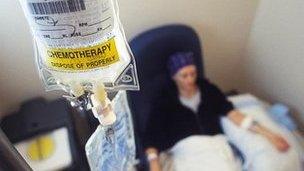Cancer waiting time target missed despite progress
- Published

1,180 out of 1,373 people referred as urgent cases started treatment within two months
The NHS is failing to meet a key waiting time target for cancer patients despite "considerable progress" in improving cancer care, according to a report by the Welsh government.
At least 95% of patients should start cancer treatment within 62 days of being referred by their GPs.
But this target has not been met at an all-Wales level since 2008, with 86% being the most recent score.
The Welsh government said it was doing well on screening and survival rates.
Figures for July to September this year show an average referral rate of 86% for patients starting treatment in the target time.
The report says the failure to hit the target is an "area of concern" but says there has been "good progress" against a number of other performance measures.
For example, overall cancer survival rates have improved more in Wales over the past 15 years than any other part of the UK.
According to the Welsh government, that is a "good indicator of the effectiveness of treatment".
Screening for bowel and breast cancers have also shown an upward trend with over 74% of the target population having been screened for breast cancer.
The report also predicts that the number of people surviving following cancer treatment is expected to rise by 26%, from 110,000 a year in 2009 to 140,000 in 2016.
And the NHS, according to the report, has consistently achieved a 31-day waiting target for cancer treatment for patients referred to hospital for reasons other than suspected cancer.
Speaking to BBC Wales, Health Minister Lesley Griffiths insisted the report on the whole showed "huge improvements".
"If you look at screening and survival rates we're doing very well. However there's work to be done and that will be the focus next year," she said.
"The 62-day target, I've made it clear to the health boards - even though it's a small number of people that we're not meeting the target with - that has to be addressed. But we have made huge improvements."
But the report also expresses continued concern about social inequalities, particularly "the high number of people who develop and die from cancer amongst our more deprived communities".
It also says the health service should do more to diagnose cancers at an early stage before they have spread to other parts of the body.
However the report says an increasing number of Welsh patients are willing to take part in cancer research, with 7% donating tissues to the Wales Cancer Bank and 14% willing to take part in clinical trials for new treatments.
Susan Morris, general manager of the Macmillan cancer charity in Wales, has welcomed the report as a good way to measure future progress but says more information needs to be made available at a local level.
Different performances
"We think the report is a good baseline to measure progress so we welcome the transparency," she said.
Owain Clarke discusses the report with Bethan Rhys Roberts
"But high level, general data can hide a wide variety of different performances.
"That's why it's important that people have access to data for their own health boards and can look at what that means for them and their particular type of cancer."
The report is the first annual report on cancer to have been produced by the Welsh government.
It follows the publication of a cancer delivery plan by the health minister in the summer.
- Published28 November 2012
- Published30 September 2012
- Published22 August 2012